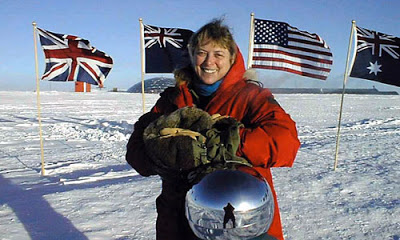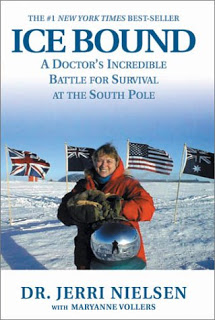Philosophy
 Jerri Nielsen FitzGerald
Jerri Nielsen FitzGerald
A time to be humble and attempt to fathom the psyche and suffering of the human species.
Dr. Jerri Nielsen FitzGerald, who diagnosed and treated her own breast cancer before a dramatic rescue from the South Pole, has died. She was 57.
Her husband, Thomas FitzGerald, said she died Tuesday at their home in Southwick, Mass. Her cancer had been in remission until it returned in August 2005, he said Wednesday.
She was the only doctor among 41 staff at the National Science Foundation's Amundsen-Scott South Pole Station in winter 1999 when she discovered a lump in her breast. At first, she didn't tell anyone, but the burden became too much to bear.
"I got really sick," she said in a 2003 interview. "I had great big lymph nodes under my arm. I thought I would die."
Rescue was out of the question. Because of the extreme weather conditions, the station is closed to the outside world for the winter. She had no choice but to treat the disease herself, with help from colleagues she trained to care for her and U.S.-based doctors she stayed in touch with via satellite e-mail.
She performed a biopsy on herself with the help of staff.
A machinist helped her with her IV and test slides, and a welder helped with chemotherapy. She treated herself with anti-cancer drugs delivered during a gripping mid-July airdrop by a U.S. Air Force plane in blackout, freezing conditions.
In a headline grabbing rescue, she was lifted by the Air National Guard in October, one of the earliest flights ever into the station when it became warm enough — 58 degrees below zero — to make the risky flight.
After multiple surgeries in the U.S., including a mastectomy, the cancer went into remission until 2005.
"More and more as I am here and see what life really is, I understand that it is not when or how you die but how and if you truly were ever alive," she wrote in an e-mail to her parents in June, 1999 from the South Pole.
Nielsen FitzGerald never lost her adventurous spirit and even returned to desolate Antarctica several more times.
"She had incredible zest and enthusiasm for life," said her husband, whom she first met 23 years ago when they were both on vacation in the Amazon. "She was kindest soul I ever met, she was intelligent, with a great sense of humor, and she lived each day to the fullest."
She documented her ordeal in the best-selling book Ice Bound: A Doctor's Incredible Battle for Survival at the South Pole. It was later made into a TV movie.
The disease made her stronger, she said in November 2001.
"I would rather not have it. But the cancer is part of me. It's given my life color and texture. Everyone has to get something. Some people are ugly, some people are stupid. I get cancer," she said at lecture in Denver.
Nielsen FitzGerald spent the last decade speaking around the world about the cancer and how it changed her life, and also worked as roving ER doctor in hospitals all over the Northeast.
"She fought bravely, she was able to make the best of what life and circumstance gave her, and she had the most resilience I have ever seen in anyone," said her husband. "She fought hard and she fought valiantly." The couple would have celebrated their third anniversary next week.
In addition to her husband, the Ohio native and graduate of the University of Toledo Medical Center is survived by parents Lorine and Phil, brothers Scott and Eric, and three children from a previous marriage, Julia, Ben and Alex.

Ice Bound: A Doctor's Incredible Battle for Survival at the South Pole
by
Jerri Nielsen FitzGerald
ISBN-10: 0786866845
ISBN-13: 978-0786866847

National Breast Cancer Foundation, Inc.
- Boobies, Ta-tas, And The Ethics Of Titillating Advertising Tactics For Non-profits
Schools have been having issues with the breast cancer awareness campaign in which bracelets are sold with the slogan "I love boobies." Similarly, cars across the country sport magnet signs urging us to "Save the Ta-Tas." There is no doubt that we need...
- Imperfect Evidence And Information For The Public
Dr. Richard Ablin, the medical researcher who discovered the prostate specific antigen in 1970, wrote an op/ed in The New York Times a couple weeks ago in which he argues that we are wating a tremendous amount of money on PSA tests for men. There is a...
- Doctor, It Hurts When I Do This
My Fellow Comedists, With all the discussion about healthcare, it seems a good time for some medicine jokes. Here's something from a bit I'm working on:I've always thought that 'pap smear' was the worst name out there for a medical...
- Magnetic Nail Polish...a New Fad?
"The Physics of Magnetic Nail Polish"byEsther Inglis-ArkellFebruary 17th, 2012io9Being of the Hack 'em Off or Chew 'em Up school of nail design, I was unaware that there was such a thing as magnetic nail polish. Now that I've learned about...
- Weddell Seal
James Weddell August 24th, 1787 to September 9th, 1834 Some people should never take up pen and ink to draw. Bill Ashworth [University of Missouri at Kansas City professor] wrote... James Weddell, an American sealing captain, died Sep. 9. 1834, at age...
Philosophy
Deceased--Jerri Nielsen FitzGerald
 Jerri Nielsen FitzGerald
Jerri Nielsen FitzGerald1957 to June 23rd, 2009
A time to be humble and attempt to fathom the psyche and suffering of the human species.
"Doctor In Dramatic South Pole Rescue Dies At 57"
June 24th, 2009
Associated Press
June 24th, 2009
Associated Press
Dr. Jerri Nielsen FitzGerald, who diagnosed and treated her own breast cancer before a dramatic rescue from the South Pole, has died. She was 57.
Her husband, Thomas FitzGerald, said she died Tuesday at their home in Southwick, Mass. Her cancer had been in remission until it returned in August 2005, he said Wednesday.
She was the only doctor among 41 staff at the National Science Foundation's Amundsen-Scott South Pole Station in winter 1999 when she discovered a lump in her breast. At first, she didn't tell anyone, but the burden became too much to bear.
"I got really sick," she said in a 2003 interview. "I had great big lymph nodes under my arm. I thought I would die."
Rescue was out of the question. Because of the extreme weather conditions, the station is closed to the outside world for the winter. She had no choice but to treat the disease herself, with help from colleagues she trained to care for her and U.S.-based doctors she stayed in touch with via satellite e-mail.
She performed a biopsy on herself with the help of staff.
A machinist helped her with her IV and test slides, and a welder helped with chemotherapy. She treated herself with anti-cancer drugs delivered during a gripping mid-July airdrop by a U.S. Air Force plane in blackout, freezing conditions.
In a headline grabbing rescue, she was lifted by the Air National Guard in October, one of the earliest flights ever into the station when it became warm enough — 58 degrees below zero — to make the risky flight.
After multiple surgeries in the U.S., including a mastectomy, the cancer went into remission until 2005.
"More and more as I am here and see what life really is, I understand that it is not when or how you die but how and if you truly were ever alive," she wrote in an e-mail to her parents in June, 1999 from the South Pole.
Nielsen FitzGerald never lost her adventurous spirit and even returned to desolate Antarctica several more times.
"She had incredible zest and enthusiasm for life," said her husband, whom she first met 23 years ago when they were both on vacation in the Amazon. "She was kindest soul I ever met, she was intelligent, with a great sense of humor, and she lived each day to the fullest."
She documented her ordeal in the best-selling book Ice Bound: A Doctor's Incredible Battle for Survival at the South Pole. It was later made into a TV movie.
The disease made her stronger, she said in November 2001.
"I would rather not have it. But the cancer is part of me. It's given my life color and texture. Everyone has to get something. Some people are ugly, some people are stupid. I get cancer," she said at lecture in Denver.
Nielsen FitzGerald spent the last decade speaking around the world about the cancer and how it changed her life, and also worked as roving ER doctor in hospitals all over the Northeast.
"She fought bravely, she was able to make the best of what life and circumstance gave her, and she had the most resilience I have ever seen in anyone," said her husband. "She fought hard and she fought valiantly." The couple would have celebrated their third anniversary next week.
In addition to her husband, the Ohio native and graduate of the University of Toledo Medical Center is survived by parents Lorine and Phil, brothers Scott and Eric, and three children from a previous marriage, Julia, Ben and Alex.

Ice Bound: A Doctor's Incredible Battle for Survival at the South Pole
by
Jerri Nielsen FitzGerald
ISBN-10: 0786866845
ISBN-13: 978-0786866847

National Breast Cancer Foundation, Inc.
- Boobies, Ta-tas, And The Ethics Of Titillating Advertising Tactics For Non-profits
Schools have been having issues with the breast cancer awareness campaign in which bracelets are sold with the slogan "I love boobies." Similarly, cars across the country sport magnet signs urging us to "Save the Ta-Tas." There is no doubt that we need...
- Imperfect Evidence And Information For The Public
Dr. Richard Ablin, the medical researcher who discovered the prostate specific antigen in 1970, wrote an op/ed in The New York Times a couple weeks ago in which he argues that we are wating a tremendous amount of money on PSA tests for men. There is a...
- Doctor, It Hurts When I Do This
My Fellow Comedists, With all the discussion about healthcare, it seems a good time for some medicine jokes. Here's something from a bit I'm working on:I've always thought that 'pap smear' was the worst name out there for a medical...
- Magnetic Nail Polish...a New Fad?
"The Physics of Magnetic Nail Polish"byEsther Inglis-ArkellFebruary 17th, 2012io9Being of the Hack 'em Off or Chew 'em Up school of nail design, I was unaware that there was such a thing as magnetic nail polish. Now that I've learned about...
- Weddell Seal
James Weddell August 24th, 1787 to September 9th, 1834 Some people should never take up pen and ink to draw. Bill Ashworth [University of Missouri at Kansas City professor] wrote... James Weddell, an American sealing captain, died Sep. 9. 1834, at age...
